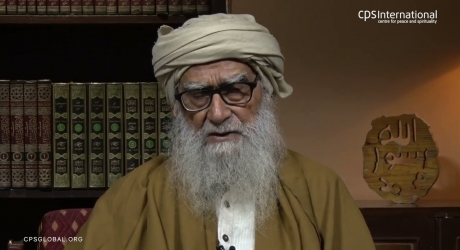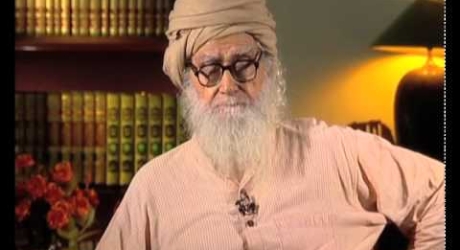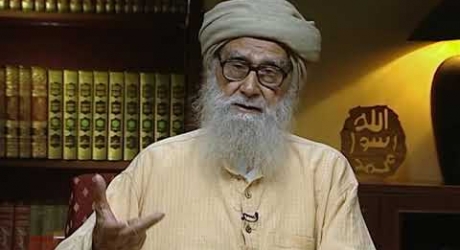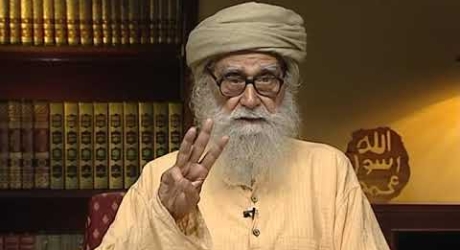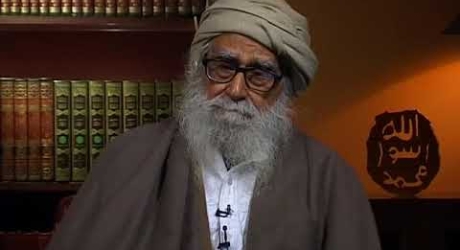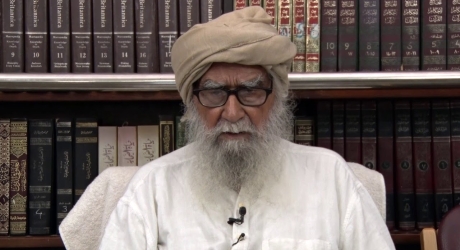Pacifism is a policy subscribed to by those who find war and its attendant evils abhorrent—violence, destruction, loss of life and in particular, the disruption of everyday existence. The law of nature maintains that peace and pacifism can be attained only on a unilateral and not bilateral basis. First, we must unilaterally abandon confrontational methods such as political activism, protest-based activism, and human rights activism. It will establish normalcy, which will lead to peace, and peace will open the door to all kinds of opportunities. Peace can only be established on a unilateral basis without confrontation. Peace for the sake of social justice is not a practicable formula. The only workable formula is peace for the sake of normalcy. Normalcy allows us to plan wisely. Wise planning is non-controversial. It can be done without confronting others, regardless of the section of the society to which they belong. The formula is: Establish a peaceful atmosphere at any cost. It will open opportunities, and availing of these through wise planning, we can achieve success.
Introduction
On May 2, 2011, the American forces killed Osama bin Laden in a secret operation. While some supported this activity, some others did not approve this approach of fighting terror. In my talk today, I shall discuss a critical lesson derived from this event. That is, militancy is not an option for anyone, neither a super power nor an individual.
Osama bin Laden’s organization, Al Qaeda unleashed a massive terror attack on the United States of America on September 11, 2009. Though the scale of destruction was huge, it did not bring about an end to the era of American power. Some years later, the American forces undertook a huge and well-planned operation in Budapest, near Pakistan where they intercepted and killed Laden. However, killing an individual Osama would not finish the Osama phenomena. As per a famous saying in Britain,
Kind is dead, long live the King. In the context of Osama, it may be rephrased as Osama is dead but long live the Osama In retaliation, Al Qaeda has threatened to avenge the death of Bin Laden; God alone knows what they will do this time but the lesson is that violence is not an option for anyone. It only increases evil.
Islamic Pacifism
Pacifism is the discipline which studies peace as a complete subject of research. In fact, there also exists an encyclopedia of peace, which unfortunately does not provide conclusive answers on matters. The fundamental thing is that man needs an ideology of peace but no one could develop it. For example, a common criterion in the minds of people is that justice should accompany peace; that peace devoid of justice is no peace. But setting such a condition for the attainment of peace is impractical. This is because peace on its own does not bring justice. The right approach is to establish peace because it opens up opportunities, which when availed may lead to justice.
Islam for the first time gave the ideology of peace to the world. But it was unfortunate that the Islamic ideology of peace was neither understood by Muslims nor could they spread its message to others. An early derailment took place in Muslims and due to the false political interpretation of Islam rendered by the clerics, Muslims worldwide became imbued with the psyche of violent “jihad.”
As per a Hadith tradition, in later times, people will legitimize “alcohol”. When asked how can that be? The Prophet replied that they will change the nomenclature and legitimize it.
Dayee’s way of working
Muhammad bin Abdullah was born in 570 A.D and after attaining Prophethood in 610 A.D, began preaching the message of God in Mecca. One of the initial verses revealed to him were Arise and give warning!.....and for the sake of your Lord, be patient (74:2&7)
This verse alludes to a principle – that is, while doing dawah work, even the Prophet of God will face adversities but in such circumstances, God enjoins the believers to exercise patience and undertake positive planning. Doing so will ensure that the mind of a believer remains free from negative thinking.
According to another verse in the Quran, Reconciliation is the best (4:128)
Let them not dispute with you on this matter. Call them to the path of your Lord (22:67)
In the above verse God ordains a dayee to avoid a situation where he may have a confronting encounter with his madu.
The above Quranic verses are suggestive of a dayee’s way of working. It explains how problems, being a part of the Creation Plan of God are bound to arise but at the same time, a dayee must learn the art of managing the problems rather than striving to eliminate them. This is the formula of pacifism.
Unrealistic expectations cannot result in peace People believe that justice should accompany peace; that peace devoid of justice is no peace. This is an unrealistic expectation. Let me explain this with an example. The protests and demonstrations undertaken by people are directed against the person they view as “oppressor”. It is notable that despite the severe adversities faced by him, the Prophet never organized an agitation or demonstration.
To understand the concept of peace, man must understand the Creation Plan of God.
Differences and problems are a part of God’s plan and cannot be eliminated. The only thing that man can do is to manage the problems. This has been told very explicitly in Quran and Hadith. For example, a Hadith states God grants to non- violence what he does not grant to violence (Muslim) Prophet Muhammad was a practical model of such an approach. For example, in Mecca, the House of Monotheism (Kaaba) had become the house of idols. Moreover, Meccans inflicted unimaginable atrocities upon the Prophet and his companions in order to discourage them from preaching the Word of God. But in the thirteen years that the Prophet spent in Mecca (after Prophethood) he did not organize a single demonstration in protest. When the number of companions grew, they wanted to fight to end the oppression but Prophet rejected the idea and asked them to strengthen themselves. Similarly, instead of getting provoked at the presence of idols, the Prophet started utilizing the gathering of idol-worshippers for spreading amongst them the message of God.
Ever since he attained Prophethood, the Prophet continued to propagate the message in Mecca despite facing severe atrocities and hardships. Since they could not succeed in deterring the Prophet form his resolve of spreading the Word of God, the Darun Nadwa (tribal Parliament) decided to kill the Prophet. When the Prophet received this news, he planned for migration from Mecca to Medina. The very night when the tribals were going to kill him, he quietly migrated to Medina with Abu Bakr so as to avoid any confrontation. On his way to Medina from Mecca, Abdullah ibn Uraiqit became his guide who even ensured that the path they followed did not leave behind a trail. This example of the Prophet teaches that one can decide a suitable course of action as per the situation one is in but the underlying principle is that peaceful settlement is the best. In other words, the deciding principle is that others must not get an opportunity to confront you.
Peace opens opportunities
While in Medina there is not a single account of the Prophet Muhammad complaining about the people of Mecca or the atrocities inflicted by them. Contrary to the Prophetic principle, the present-day Muslims follow the policy of internationalizing the problem so as to gain popular support. The book, Ar Rasool fil Medina is a compilation of the speeches delivered by the Prophet during his stay in Medina. The topic of these speeches was God and God-realisation, even though all this while, his opponents did not refrain from launching regular, offensive campaigns to de-stabilise the Prophetic mission. It was due to proactive planning of the Prophet and his Companions that these potential battles concluded as a mere skirmish.
For instance, on the occasion of Battle of Trench, no battle really took place. When the Prophet and his Companions got the information that an army of 12,000 men is approaching to launch an offensive at Medina, it was decided that Medina, which was inaccessible by three sides because of its terrain will be made inaccessible from the fourth and final side by digging a trench; the trench was to act as a buffer between the aggressors and the Medinans.
As a result, the opposition army had to halt their progression upon reaching the other side of the trench. They camped their for some days but eventually the army retreated.
The constant attacks by the Meccan tribes was an obstacle for engaging in dawah efforts. In order that dawah work flourishes and interaction resumes, the Prophet began negotiations for materializing a peace treaty with the Meccan tribes. Restoring peaceful atmosphere was so crucial to dawah work that Prophet unilaterally agreed to all the terms and conditions posed by the Quraysh. Some of these conditions were harsh and humiliating. For example, one of the conditions accepted by the Prophet was that if a Meccan adopted Islam and went to Medina, it was binding on Medinans to send him back to Mecca. Whereas if a Medinan Muslim came to Mecca, he will not be returned to Medina. The Meccans made the conditions as tough as they could to discourage the Muslims.
Even at the time of signing the Treaty, they did not agree to the title “Prophet” to be written before the name of Muhammad. But because the Prophet wanted to sign the Treaty at any cost, he did not think the least before striking it off from the paper. It was after such sacrificial management that a ten-year no war pact came into being.
What is Peace?
Most scholars term the “absence of war” as peace; however this to my mind is an incomplete definition. Peace is a positive phenomenon so a positive definition of peace would be, “absence of war and presence of opportunities.” The opportunities in the case of the ten-year no war pact were the increased avenues for interaction and engaging in dawah work. Within two years of this Treaty, entire Mecca came under the fold of Islam. This was an event of utmost significance. In fact, this corroborates exactly with a Biblical prediction which says,
He will come with 10,000 saints.
Thereafter, Muslims started sending emissaries to nearby countries and kings with the effect that entire tribes used to embrace Islam.
According to a tradition in Bukhari, Prophet Muhammad enjoined the believers to abstain From Khurooj (or revolt) so that peace prevails and opportunities could be availed.
Khurooj (revolt) refers to refraining from extending cooperation to the ruler of the land. Contrary to this, the principle of not organizing protests against the ruler saves political confrontation and allows one to avail the opportunities that exist. Any activity done in revolt of the rule of an established sovereign is considered illegitimate in Islam. For example, during the Abbasid period corruption had become rampant. Yet the Muhaditheen (teachers of Hadith) did not confront the corrupt leaders of Abbasid period. Instead they completely distanced themselves from it and dedicated their efforts towards compilation of Hadith. The patience exhibited by these Muhaditheen is exemplary. This is the model for every believer. If he sees a wrong taking place, the maximum he can do is to meet the doer in person and advise him of the repercussions of his wrong act. But irrespective of whether the ruler is just or unjust, a believer cannot launch a protest against him; this is not allowed in Islam.
According to a tradition in Bukhari, under no condition is a believer permitted to launch an offensive. The first stage is negotiations and attempts at peacemaking. If these fail and the opponents launches an aggression, defensive war is permitted in Islam. But even during such times, fighting must be restricted to combatants; non combatants cannot be harmed.
Conclusion
Modern civilization has changed the landscape of our world significantly. The modern weapons such as the weapons of mass destruction wreck havoc on combatants and non-combatants, alike. So, there does not remain an option of resolving conflicts through warfare.
I once met a researcher from Harvard University and during our conversation; I asked him how he thought peace could be established. He said he was not sure because he did not have clarity on the subject.
Unfortunately, Muslims have forgotten the Prophetic principle of maintaining peace and are engaged in unproductive endeavours. The reason for this is selective reporting of expeditions and campaigns in the books of Fiqh (Jurisprudence). For the first time, a Christian scholar, Professor T W Arnold described the emergence and spread of Islam in detail giving due credit to dawah work which happened because of the powerful ideology of Islam. It is erroneously believed that Islam spread in India by force. A chapter in my book, Indian Muslims, titled, Peaceful penetration of Islam in India quotes Swami Vivekananda who said that it is non-sense to say that Hindus were converted to Islam by force.
But most people formulate their opinion basis media reports. They do not understand that media is the industry of selective reporting. For instance, when in 1992, the Babri mosque was demolished; media selectively reported the demolition of one mosque but did not report about more than five lakh mosques which existed, completely intact here in India. Similarly, I once got to know that a skirmish took place in the area of Seelampur in Delhi; while the Indian daily reported, “Dilli mein fasad,” the Pakistan daily published news titled, “India mein fasaad.”
These examples explain the need for adopting the Prophetic wisdom so that one does not get misled by negative propaganda. The test of a true believer lies in scrutinizing the situation at hand so that peace prevails and opportunities can be availed.
Question-Answer
Q1: I have discovered that being misled has a limit whereas realization is endless. Please comment.
A: Speed-breaker is a part of life. They test man’s mettle to encounter the situation he is in –whether he will face it with courage and determination or get discouraged and stop his efforts. For a seeker, a speed breaker acts like a stepping stone unlike non-seekers who get daunted by difficulties.
Q2: You said, my teacher is God Himself and I speak from inspiration of God. What does “inspiration” mean?
A: According to a Hadith
Bande ki sargoshi allah se hoti hai [Believers get into a whisper with God] (Mishkat) Ulema unanimously agree that while Wahy or revelation comes to a Prophet; Ilqa and Ilham or inspiration may happen to a common man. It is recorded that when Ibn Taimiyya could not understand the meaning of some portion of the Quran, he would pray to God saying,
O Teacher of Abraham and Adam! Guide me as you guided them!
Q3: According to a Hadith, “Meri ummat gumrahi par jama nahin ho sakti”
A: People mis-interpret the above to mean that in a majority situation, justice will prevail because all will never be led astray. But this is a wrong interpretation. Majority is not the yardstick in this case. It means that amongst the followers of the Prophet some will always discover truth and spread it to the rest of the people and therefore all will never be led astray.
Q4: Who is Insaan-e-kamil?
A: This word neither exists in the Quran nor the Hadith. It is an innovation in the religion (bidat). The target of this life is not to form a “complete” man. This world is a testing ground and such a phrase cannot be applicable in the context of a test.
Q5: What was your experience in Dubai with respect to the Al-Risala movement and dawah work?
A: Dubai is a junction of East and West and is therefore not a fanatic country. Dawah work rests upon interaction. Madu from world over visit Dubai and if the dayees collaborate to do peaceful dawah work, the government will not hinder their work.
Q6: How can we become what God desires us to be?
A: In order to become what God wants us to be, we will have to inculcate the attributes of God within us. The biggest attribute of God is that He is Compassionate and Merciful. This means that we must become sincere well-wishers of our madu and live with a unilaterally adjusting frame of mind. We will have to live with an entirely positive thought process to keep our heart free from malice and negativity. According to the Quran:
God brings good times upon man to test if he makes it a matter of pride. God brings hard times upon man to test if he succumbs to negativity.
While man inculcates hubris in good times, he starts blaming God for the bad ones. The psyche of complaints is not acceptable before God because He seeks a complex-free soul. It will only be on the Day of Judgment that we shall know about the men whom God accepted as deserving of entering into His Paradise.
Q7: Spirituality which aims at stopping the thinking process is de-humanising. How can man control his mind?
A: There are two different schools of spirituality: heart-based and mind-based (contemplative).
Heart-based spirituality suggests the target of the spiritual quest is to be found within one’s own self. According to this school of thought, reality is located inside our own personality and we have to simply look inside ourselves and establish contact with our inner self to find a treasure of spirituality. Since man is a limited being, looking for an unlimited reality inside a limited being is not possible.
Islamic concept of spirituality or Rabbaniyat is mind-based. According to this, the target of the spiritual quest of man is that the creature – man – has to discover and realize God – his Creator, to whom he is accountable, and make contact with Him through the process of contemplation or tafakkur or tadabbur or tawassum as mentioned in the Quran. That is to say that God is the treasure house of all virtues. And when man’s contact with God is established, through contemplation, in the world of his feelings, at the psychological level, an unseen, inner revolution is brought about which is called rabbaniyat or spirituality. In this matter the relationship between God and man can be likened to an electric wire and the powerhouse.
When the wire is connected to the powerhouse, electricity is produced, and the place is lit up.
In this way, light is the result of the wire’s connection to the powerhouse of God.
Q8: What is the principle of building the right kind of personality?
A: Every person is born with the right kind of personality but the environment around him gradually colours his thinking. According to Watson, conditioning of human mind is a fact.
But it is notable that the human mind is like an onion. Despite being covered by layers, it retains its innermost kernel (or nature). Similarly, if man consciously strives to remove the layers of conditioning that surround his nature, he may revert to his nature. In order to de-condition his mind, man must subscribe to self-hammering and anti-self thinking. Unless man does so, he will not break free from the shackles of conditioning.
Q9: Can man attain spirituality without help from God?
A: According to mysticism, man’s heart is the centre of all power. Rajneesh in his book, Kundalni andar base, describes the case of a deer which runs outside in search of fragrance (of musk) which is stored in its own stomach. I however, do not agree with this. My study has made me understand that no achievement in this world is possible without the help of God.
According to a tradition in Muslim,
Tum mein se har shakhs bhatka hua hai, siwaye uske jise mein rasta dikhaun.
[Each one of you is misled, save those whom I guide]
Q10: What is the difference between scrutiny and distraction?
A: Scrutiny is the act of verifying facts after they have been told. Irrespective of what news has come your way, you must first scrutinize the events and then accept it. Not doing so, is actually a crime.
Distraction is the phenomena that we grapple with in our daily lives. It is the way of Satan to distract man so that he succumbs to unproductive endeavours. For the believers, it has been indicated in the Quran that when Satan touches them, they become alert.
Q11: How should man save himself from selective reporting?
A: Man does selective reporting out of prejudice. To manage the complexes is a test that man ought to face. If man keeps his nature alive, he can easily distinguish between selective and complete reporting. For example, media is a selective news reporting industry. The problem is that most people do not understand this. They read what is showcased in the media and formulate opinion without adequate scrutiny.
Q12: What is the ideology of peace in Islam?
A: Scholars have defined peace thus: “Peace is the absence of war.” This definition is absolutely correct. Peace in fact means the absence of a situation of war or violence.
However, some people hold this definition of peace to be inadequate. They say that justice should accompany peace; that peace devoid of justice is no peace. But setting such a condition for the attainment of peace is impractical. This is because peace on its own does not bring justice. That is, justice is not necessarily an element of peace. What peace does, in actual fact, is to open up opportunities. It creates favourable conditions that would enable us to strive for justice and other constructive ends. Peace is always desirable for its own sake.
Everything else comes after peace, not along with peace. A peace policy always serves as a peace ‘bomb’, in the sense that it conquers the enemy without any bloodshed. History shows that the peace bomb has always proved to be mightier than the violence bomb.
Q: Please explain the Quranic term, “Muttaqiyon ka imam” (25:74)
A: This term refers to the responsibility of elders in the family. It is said that when as an elder you give an advice or lead to people, it should be a good piece of advice. You should not arouse wrong or negative sentiments in their mind but lead them righteously. A leader – in family or outside – should therefore be very careful of his position and wary of the path he leads his people to.





